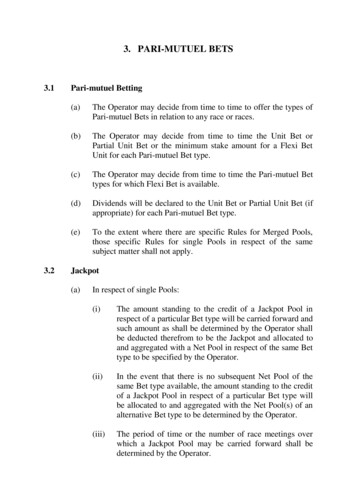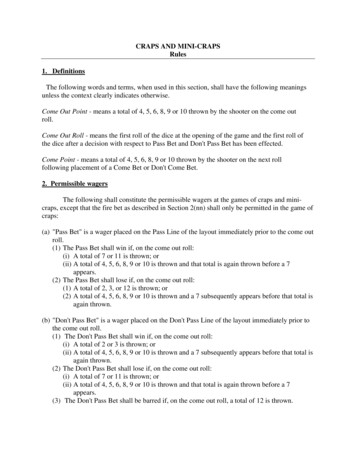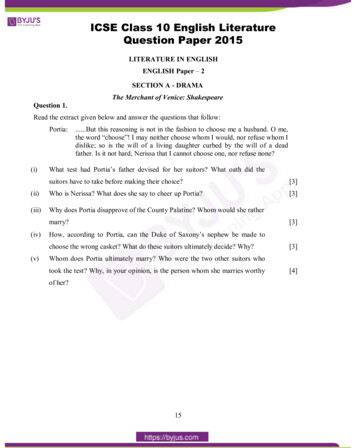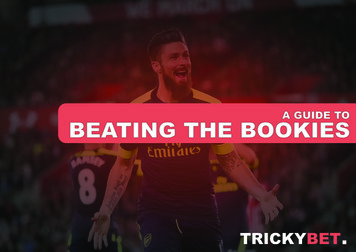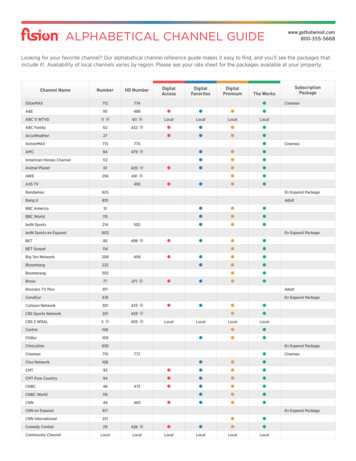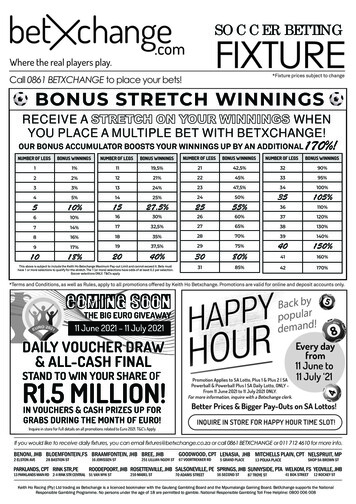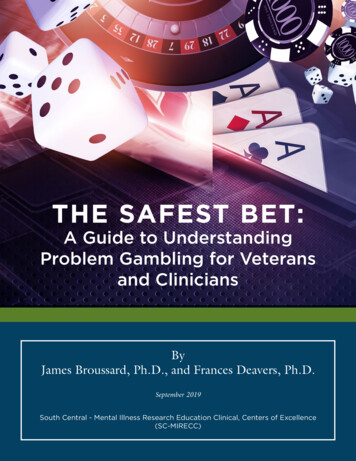
Transcription
THE SAFEST BET:A Guide to UnderstandingProblem Gambling for Veteransand CliniciansByJames Broussard, Ph.D., and Frances Deavers, Ph.D.September 2019South Central - Mental Illness Research Education Clinical, Centers of Excellence(SC-MIRECC)
AcknowledgmentsThis updated workbook was prepared by James D. Broussard, Ph.D., and Frances Deavers,Ph.D. with the support of the South Central (VISN 16) Mental Illness Research, Educationand Clinical Center (MIRECC). Dr. Broussard is a staff psychologist at the G. V. (Sonny)Montgomery VA Medical Center in Jackson, Mississippi. He is also a research affiliate withthe South Central MIRECC and an assistant professor with the University of MississippiMedical Center Department of Psychiatry and Human Behavior. Frances Deavers is a staffpsychologist at the Michael E. DeBakey VA Medical Center in Houston, Texas, and anassistant professor at Baylor College of Medicine.The original materials and workbook were developed by Jefferson D. Parker, Ph.D.; RandyS. Burke, Ph.D.; Frances Hill, C.C.G.C.; and Paul Matens, L.C.S.W. (2000), with the support ofa VISN 16 MIRECC Clinical Education Grant.The authors wish to acknowledge the work of James M. Fitterling, Ph.D., and MichaelBreus, Ph.D., which was incorporated into Module A of this workbook.This material is in the public domain and may be reproduced or adapted fornoncommercial use. Please acknowledge both the authors and MIRECC.Suggested citation:Broussard, J., & Deavers, F. (2019). The Safest Bet: A Guide to Understanding ProblemGambling for Veterans and Clinicians. Houston, TX: Department of Veterans Affairs SouthCentral Mental Illness Research Education Clinical Center.2
TABLE OF CONTENTSHOW TO USE THIS WORKBOOK .4INTRODUCTION AND ORIENTATION .5EDUCATION MODULES OVERVIEW . .12Module A:Lesson 1: READINESS TO CHANGE . .15Module B:Lesson 1: GAMBLING, CHANCE, AND ODDS .23Lesson 2: THINKING ERRORS, THINKING TOOLS .28Module C:Lesson 1. RECOVERY TOOLS: DEALING WITH CUES ANDTRIGGERS .38Lesson 2: RECOVERY TOOLS: PROBLEM SOLVING .44Module D:Lesson 1: GAMBLERS ANONYMOUS .50Lesson 2: STEPS 1, 2, AND 3 OF GAMBLERS ANONYMOUS .54CONCLUSIONS .64ADDITIONAL RESOURCESFinding Help for Problem Gambling .66Personal Signs of Problem Gambling .67S-T-A-R-E Problem-solving Worksheets .683
HOW TO USE THIS WORKBOOKProblem gambling is a significant concern for those that gamble and society as a whole.The intention of this education workbook is to help Veterans and others learn more aboutissues related to gambling and to locate additional resources for problem gambling. Itcan be used in sessions with a clinician, in a group with other Veterans, or as a self-helpresource.The first section of this workbook contains an outline for an introduction and orientationsession, which is recommended to be completed with a provider that is knowledgeableabout problem gambling and related issues. After this section, the remainder of theworkbook is divided into four modules with multiple lessons. Each module focuses ona specific topic relevant to problem gambling. If a Veteran is working with a treatmentprovider, they can complete the modules in individual sessions. Clinicians should recognizethat it may not be necessary to cover every module or lesson in the workbook, and soyou can tailor the number of sessions to fit the needs of each individual Veteran. Thisallows providers working in Primary Care and similar settings to review topics on problemgambling in brief, structured sessions. Alternatively, this workbook can be used in a groupformat and spread out over eight or more sessions. Our recommendation to cliniciansusing a group format would be to complete the introduction and orientation sessionindividually with each new member. Otherwise, if starting a group with all new members,you can complete the introduction and orientation session during the first group session.Afterwards, one lesson can be completed in each group session until all materials havebeen covered. Finally, for Veterans lacking access to a provider, this workbook can begiven as a resource to work through at home. However, Veterans using this workbookfor self-help are encouraged to seek out a VHA provider or other helping professional toanswer additional questions or address any concerns. Please review the resources list inthe back of the workbook for more information.This workbook is intended to be a resource for educating Veterans and others on issuesrelated to problem gambling. It is NOT to be used for formal treatment of problemgambling. Those interested in evidence-based treatment for problem gambling areencouraged to consult with a treatment professional that has expertise with gamblingdisorder. It might also be helpful to examine the resource list in the additional resourcessection at the end of this workbook for information on help for problem gambling.4
INTRODUCTIONAND ORIENTATIONGambling and Problem GamblingSimilarities to Substance UseIdentifying Signs of Problem Gambling5
INTRODUCTION AND ORIENTATIONIn this session we are going to discuss: What is the difference between games of skill and games of chance? What is social gambling, and what is problem gambling? How is problem gambling like problematic alcohol and substance use?Section 1: What is Gambling?The Random House Unabridged Dictionary defines gambling as:Gambling - “The activity or practice of playing at agame of chance for money or other stakes.”There are a few parts that are important to determining whether an activity counts asgambling. To be considered gambling, the following must be true:1. Money or stakes are bet or wagered on the outcome of the game or event.2. The outcome of the game or event must be uncertain, based on chance or probabilities.Common gambling activities include playing lottery tickets, slot machines, and cardgames such as blackjack. There is no way to predict the outcome of any of these gamesof chance. However, people can be confused about the difference between a gameof chance and a game of skill. Betting on a game in which you control the outcome(for example, pool, bowling) is different than betting on a game of chance. For sportsand skill games, you can improve your chances of winning by practice. With enoughpractice, you could remove any chance of losing. This is different from other types ofgambling in which chance events play a big part in the outcome. Even though there aresome games of chance (blackjack, horse racing) that allow you to improve your chancesof winning to some degree, these games are not games of skill because no amount ofknowledge or strategy can make winning certain (the chance part of the game cannotbe overcome by practice).Social gambling, by definition, is gambling for entertainment that does not causesignificant financial difficulties and does not cause disruptions in a person’s family lifeor occupational pursuits. However, gambling sometimes leads to such difficulties. Let’sconsider some problems that can arise from gambling.6
Section 2: What is Problem Gambling?Problem Gambling is defined as having some gambling-related difficulties, which can alsobe called symptoms. Having many of these symptoms, at the same time or within thesame year, could mean that you have something called a gambling disorder. However, theterms problem gambling and gambling disorder are often used to mean the same thing.Generally, having a few gambling-related problems indicates problem gambling; and themore gambling-related problems you have, the more likely it is that you might have agambling disorder.According to the American Psychological Association, gambling disorder is considered anaddictive disorder, just like alcohol use disorder.The main symptom of gambling disorder is “repeated problematic gambling behaviorthat causes significant problems or distress.”Let’s look more closely at this sentence.The first part says that problem gambling is repeated, problematic gambling behavior. Therepeated part means that you keep gambling even when you do not intend to. You goback to gambling establishments, even though you tell yourself that you need to stop.The significant problems or distress part means that the way you gamble hurts you andother people. One example of this is spending your whole paycheck at the casino andthen not having money to pay bills or buy food.Gambling disorder often disrupts personal, family, or vocational pursuits. Simply put, thisis when gambling has caused you problems with your job, your family, and your life.Problem gambling is very different from social gambling. Social gamblers: Do not have any problems because of their gambling Only gamble once in a while and for a set period of time Set aside a certain amount of money for gambling (entertainment money), and when itis gone, they stopSo, to sum up, people who have issues with problem gambling (which includes those withgambling disorder) often: Lose control when they gamble Keep on gambling even though they want to stop Gamble in a way that hurts them Have family, legal, and job-related problems because of their gambling7
Section 3: How is Problem Gambling like Other Addictions?Problem gambling is a lot like other addictions. However, you might notice they aredifferent in some ways: Gambling does not automatically alter a person’s mind like alcohol or drugs. You don’t have to smoke or drink anything when you gamble. A person cannot die from an overdose of gambling. Unlike many drugs, gambling is legal in most places. A person might win a lot of money gambling.However, to help you better understand how problem gambling IS like other addictions,let’s take a closer look at some things they have in common. See this side-by-sidecomparison of SIGNS for both problem gambling and problematic substance use.SIMILARITIES BETWEEN PROBLEM GAMBLINGAND PROBLEMS WITH SUBSTANCE USEPeople who have problems withProblem Gambling:People who have problems withSubstance Use: have a preoccupation or obsession withobtaining money to gamble have an obsession with taking or gettingdrugs or alcohol gamble with larger amounts of money, andfor longer periods of time, than they plan to drink or use more, and for longer periods oftime, than they plan to need to increase the size and how oftenthey bet to get the same level of excitement(called TOLERANCE) need to increase the amount of alcohol anddrugs they take to feel drunk or high (calledTOLERANCE) often have characteristic withdrawalsymptoms when they stop gambling often have characteristic withdrawalsymptoms when they stop drinking or using often return to gambling to try and winback lost bets often drink or use to avoid withdrawal symptoms keep trying to cut down on their drinking ordrug use (that is., three or more times). keep trying to cut down on gambling (thatis, three or more times). give up friends, work, and hobbies to drink or use give up friends, work, and hobbies to gamble continue to drink or use even though theyknow that it is causing problems with theirfamilies, jobs, health, and the law continue to gamble even though theycannot pay their debtsWhen we look at the table, it becomes clear that problem gambling has a lot in commonwith other addictions. One of the biggest symptoms is that the person CANNOT STOPGAMBLING even though HE/SHE WANTS TO OR NEEDS TO.8
ACTIVITY 1: IDENTIFYING SIGNS OF PROBLEM GAMBLINGDirections: Read the following story about a gambler named Andre, and see if you canspot any signs of problem gambling:Andre is a 39-year-old man from Florida who likes to gamble at the casino. He usuallygoes every Friday and Saturday night and gambles for three or four hours. Though healso bets on skill games such as darts and bowling, he has consistently been spendingmore and more money on slot machines over the past year. When Andre first startedgambling a few years ago, he played nickel slots; but in the past year he has gone fromnickel machines to quarter machines, and now most nights he plays the dollar machines.Sometimes, Andre ends up staying at the casino all night and misses out on sleeping. Healso tends to drink more alcohol and eats a lot when he gambles, and he has started to puton weight. A few months ago, Andre’s wife got mad because he was spending so muchtime at the casino. Andre explained to her that he doesn’t enjoy other activities as muchas gambling. She threatened to leave him if he didn’t stop going to the casino; and for afew weeks, he tried to quit. However, Andre was so irritable during that time that his wifefinally gave in and told him he could go. Now Andre is trying to keep his gambling undercontrol but continues to stay at the casino longer than he plans to.In what ways does Andre seem like he might be experiencing problem gambling?Which of the signs does he show?1)2)3)4)5)Just as you were able to identify signs of problem gambling in the story above, it mightalso be helpful to examine your own life for such signs.9
ACTIVITY 2: PERSONAL SIGNS OF PROBLEM GAMBLINGDirections: The following 20 questions include various difficulties that are sometimesassociated with gambling. Read through and answer each of the “Yes” or “No” questions.When you are done, count the number of “Yes” answers and read over the information onthe next page.QUESTION1.YESNOIn the past year, have you ever lost time from work or school due to gambling?2. In the past year, has gambling made your home life unhappy?3. In the past year, has your gambling affected your reputation?4. In the past year, have you felt sorry after gambling?5. In the past year, have you gambled to get money with which to pay debts orotherwise solve financial difficulties?6. In the past year, has gambling caused you to lose motivation?7. After losing did you feel you must return as soon as possible and win backyour losses?8. After a win did you have a strong urge to return and win more?9. In the past year, did you ever gamble until all your money was gone?10. In the past year, have you borrowed money to finance your gambling?11. In the past year, have you sold anything to get money for gambling?12. Did you try not to use “gambling money” for normal bills?13. In the past year, has gambling made you not take good care of yourself andyour family?14. In the past year, did you gamble longer than you had planned?15. In the past year, have you gambled to “get away” from your problems?16. In the past year, have you done or thought about doing something illegal toget money for gambling?17. In the past year, has gambling caused you to have sleep problems?18. In the past year, have you wanted to gamble after you got some bad news orgot mad or had a fight with someone?19. In the past year, have you wanted to gamble after you got some good news?20. In the past year, have you thought about hurting or killing yourself becauseof gambling?Note: Questions adapted from “The 20 Questions of Gamblers Anonymous” Retrieved from Gamblers Anonymous uestions.10
If you answered “Yes” to many of the questions in Activity 2, then your gambling may beinterfering with your life. In fact, the more questions you answered “Yes” to, the higher thechance that your gambling can be classified as problem gambling. Also, your activitiesmight put you at risk for other problems, such as with alcohol, drugs, or depression. Thisdoes not necessarily mean that you have a gambling disorder, but it might mean youshould think about making some changes in your gambling habits.If you have identified that your gambling is causing problems in your life, consider workingthrough this education workbook to learn more about problem gambling and ways to gethelp. Turn to the next section for a brief introduction to the different modules and lessonscontained in this workbook. You might also consider showing your answers to a friend,family member, or treatment provider whom you trust. They can give you feedback, andprofessional treatment providers might also have some good ideas about what you can doto learn more.In addition to this education workbook, there are many resources available online thatcan help (see additional resources section at the end of the workbook). If you areenrolled in VHA healthcare, talking to your doctor can also be beneficial. Somemedications can help to manage urges to gamble or to address anxiety, depression,substance use, and other problems that may be linked to problem gambling. Talk to yourdoctor or other treatment providers if you would like to explore these options.Important Note: If you answered “Yes” to thoughts of hurting or killing yourself becauseof gambling, it is important that you let a provider or other qualified health professionalknow. If you are currently having thoughts of hurting or killing yourself, call the Veteranscrisis line at 1-800-273-8255 and Press 1, call “911,” or go to your nearest emergency roomto receive care.11
EDUCATIONMODULES OVERVIEW12
EDUCATION MODULES OVERVIEWIf you would like to gain more knowledge about the topics presented in the introductionand orientation, we welcome you to continue to work through the lessons within thefollowing education modules. These lessons have a lot of information in them, and webelieve the information will help you develop a better understanding of your gambling.After learning more, you can decide if you are READY to change your gambling in someway. Whether you just want to cut down on gambling or decide that your life can bebetter without gambling, these lessons and the additional resources provided can give yousome ideas about HOW TO CHANGE IT.If you feel this is something you can manage on your own, take this workbook andcomplete each lesson within the four modules. If you think you will need help workingthrough these materials, consider scheduling an individual session with a treatmentprovider or other support person and come up with a plan to complete the workbooktogether. In some settings, you might even be able to complete this workbook in a groupwith other Veterans.Let’s look at a brief overview of the materials contained in this workbook:In the Introduction and Orientation session, we discussed the basics of gambling:1. What is gambling?2. What is problem gambling?3. How is problem gambling similar to alcohol and drug addiction?4. How is problem gambling different from problems with substance use?Next, in Module A: Lesson #1, you will learn about Readiness to Change and how toincrease it.1. What is motivation?2. How do you find reasons to change?3. What is readiness to change and how do you increase it?In Module B: Lessons #1 & #2, we will discuss chance and odds and learn about somespecial ways problem gamblers think about gambling.1. What is chance?2. What affects the odds (and what doesn’t)?3. What is the “gambler’s fallacy”?4. How do you “fix” thinking mistakes?13
In Module C Lessons #1 & #2, you will learn some skills and tools you can use to helpchange your gambling.1. What are “gambling cues”?2. How can I deal with urges to gamble?3. What is S-T-A-R-E Problem Solving?4. How can problem solving help with gambling?Last but not least, in Module D during Lessons #1 and #2 we discuss GamblersAnonymous1. What is Gamblers Anonymous and how does it compare to Alcoholics Anonymous andNarcotics Anonymous?2. What are the first three steps of Gamblers Anonymous?3. Where can I find a Gamblers Anonymous meeting or a contact?14
MODULE ALesson 1: Readiness to Change15
READINESS TO CHANGEIn this lesson, we are going to discuss: What is motivation? How do you find reasons to change? What is readiness to change and how do you increase it?Section 1: Motivation and Reasons for ChangeMotivation is inside us; no one knows anything about your motivation until you DO or SAYsomething. Making decisions about someone’s motivation based on what they say is notvery reliable: people often “talk the talk” without “walking the walk.” So, what you DO isthe best way you have to show others (and yourself!) what your inside motivation really is.There are a few very important things to remember about motivation:1. Motivation is not a feeling or emotion.Motivation can have a positive feeling or emotion with it but not always. There are lotsof things we do that we do not have positive or excited feelings about. Think about yourmotivation to brush your teeth, to go to bed, to go to a doctor’s appointment, or to mowthe grass. We DO these things, but we don’t usually get excited about them or have happyemotions about them.2. Motivations compete against each other.Think what happens when your alarm clock rings early in the morning. You want to keepon sleeping but you feel you have to get up and go to work. The motivation to keepsleeping fights against the motivation to keep your job. We sometimes want two differentthings at the same time. For instance, you might want to keep gambling at the same timethat you want to stop gambling.3. Motivation changes. Sometimes it changes fast.Once you finish a big meal, how does your motivation to eat compare to what it was beforethe meal? Is there anyone you dislike that you used to love being around? How strong isyour motivation to gamble while you are sitting in church? How about when you are in theparking lot of the casino? Motivations can sometimes change in a “blink of an eye.”16
4. People, places, or things that change our motivation to do somethingare called “motivators.”We are surrounded by motivators. The smell of bacon frying in the morning can be amotivator to eat. The sight of a police car can be a motivator to drive slower. The soundof dominoes, a slot machine, or a roulette wheel can be a motivator to gamble. There are“cues” inside and outside us that make our motivations stronger or weaker.So, many people feel motivated to continue gambling at some times and not others. Itdepends on the people, places, and things that you experience, your mood, and otherthings, too. With so many different things motivating gambling, it is important to discusswhy a person would want to make a change. Reasons for change can take many forms.They might include getting into arguments with family members over money, not living upto some personal value, or being broke. Although some of these are also considered signsof problem gambling, the difference is that reasons for change must be personal!Unlike signs of problem gambling, which anyone can identify, NOBODY can tell a personwhat his/her reasons for change are. For instance, if a gambler is okay with getting intoarguments with family members at times, then this would not be a reason for change. If agambler feels good about his/her values while gambling, this is not a reason for change.However, if the same person is tired of being broke all the time, being broke would be areason for change. Let’s take a look at some different reasons for change that people have.17
ACTIVITY A1: REASONS FOR CHANGEDirections: Here is a worksheet that will help you understand some of the reasonspeople choose to change their gambling. Remember, a change can involve reducing theconsequences of problem gambling, cutting down on gambling, or stopping gamblingaltogether.Step 1: List all the possible reasons for change that a person might have in each of thefollowing areas. They do not have to be your own personal reasons. List any reasons at allthat a person might have, in general, for making changes to his/her gambling.LIFE AREAREASON FOR It can sometimes be surprising to discover all the possible reasons there are! As youthink of them, write down new Reasons for Change on your list.18
Step 2: Now, ask your peers what their reasons are. Ask your counselor, calla relative who gambles, or ask your friends. Try to add at least six more reasons to changeto your list. You might even learn some that could apply to you.FamilyPeersCounselorsAA / NA SponsorStep 3: When you are finished, go over all the reasons you’ve listed and place a checkmark next to any that apply to you and your own gambling.19
Section 2: Readiness to ChangeReadiness to change means how ready you are to begin making some type of change toyour gambling. We use what we call a “decision scale” to weigh our readiness to change.The scale has two “weights”: Reasons to Change and Reasons to Stay the Same. Formany people, the two sides balance each other, making it more difficult to begin makingchanges.It looks like this:REASONS TOCHANGE YOUR GAMBLINGREASONS TOSTAY THE SAMEONS T EOSREA HE SAMTSTAYREASSONTOONS URSAOREGE Y GNACHBLINGAMTOACHSSONREATONGECHANGEA goal of the exercise on the next page is to increase the “weight” on the Reasons toChange side of the scale. Hopefully, when you are done, your scale will look more like this:20
Section 3: Increase the WEIGHT of Reasons to Change.Now that you have found some of your own reasons, try giving them more personalmeaning; make them important parts of your life, and feel good about yourself when youdo. Read the sample below and fill out your own PERSONAL WEIGHTING sheet on thenext page.Step 1: Look at your list from Activity A1, and select the most important reason that youchecked off for yourself (your most important reason for change). For example, a person’sreason to change might be:Gambling is affecting my marriage.Imagine yourself changing your gambling and then experiencing the BENEFIT of your changein this area. The BENEFIT of change for a person affected in their marriage might be:To become a better spouse.Step 2: Now, imagine successfully living out this BENEFIT. Write down seven (or more)SPECIFIC things you could do to show that BENEFIT in daily life. Here is an example:BENEFIT: To become a better spouse.SPECIFICS: (What a good spouse does and looks like)1.Does chores around the house.2.Expresses love3.Is faithful4.Brings home ALL of his/her paycheck5.Shares his/her possessions(Of course, there are MANY others; but you get the idea.)Step 3: Pick one of the "specifics" and GO OUT AND DO IT (DON’T WAIT)!Step 4: After you've done it, congratulate yourself for starting to become (as in theexample) -- a better spouse -- for that is what you've done. Notice how you feel aboutyourself for actually starting to live out your reasons for change. Now look at the nextpage, and fill out your own PERSONAL WEIGHTING SHEET.21
ACTIVITY A2: PERSONAL WEIGHTING SHEETDirections: First, select your most important reason for change from the previous activity.Then, list the BENEFIT that changing your gambling would have for this area of your life.Afterwards, fill in specific things you could do to begin living out this BENEFIT and thencomplete steps 3 and 4. Refer to the example on the previous page if you need help.Step 1:REASON FOR CHANGEBENEFITStep 2:SPECIFICS (things that are proof that the BENEFIT is in my life.)1:2:3:4:5:6:7:8:9:10:Step 3: Pick one of the “specifics,” and GO OUT AND DO IT (DON’T WAIT)! Then pickanother one; and do it, too. In fact, mark every one that you can do in the next week, andmake a commitment to do them.Step 4: Place a “CHECK” in front of each one after you have completed it. Then, find away to reward yourself for your hard work and progress: see a movie, have a meal out, buyyourself a treat, or something like that. You can be proud and thankful that this BENEFIThas started becoming a real part of your life. In this way, your readiness to change canincrease as you recognize the benefits of change in your life. Continue to “tip the scale” infavor of changing your gambling.22
MODULE BLesson 1: Gambling, Chance, and Odds
GAMBLING, CHANCE, AND ODDSIn this lesson, we are going to discuss: What do chance and odds mean? What affects probability, and what doesn’t?Section 1: What is Chance?Remember the definition of gambling? Let’s do a quick review .The Random House Unabridged Dictionary defines gambling as:Gambling - “The activity or practice of playing at agame of chance for money or other stakes.”OK, so far, so good. But what is chance?This time the dictionary says:Chance – “An unpredictable event or accidental happening”So, if we’ve got this right, gambling involves:1. An unpredictable eventA predictable event is one that is not based on probabilities; you can determine within areasonable margin of error whether or not it will occur. Rather, unpredictable events arebased on probabilities, which are based on the chances of one outcome or another. Thechances are what “odds” are based on, and “odds” are what bets are based on!Let’s try to understand these topics in greater detail.24
ACTIVITY B1: PREDICTABLE OR UNPREDICTABLEDirections: Here is a list of “events” in the real world. Put an “X” next to each one that youthink is an “unpredictable”:The next full moonA flip of a coinThe next town in the US to have a tornado go through itThe fifth playing card I pull out of a full deckYour age seven years from nowWho will win the next Super BowlThe date of the next Super BowlThe winner of the next Kentucky DerbyThe date on the next coin I get from the cashierHow did you decide which were chance?25
Some events are predictable because, barring some very rare c
games such as blackjack. There is no way to predict the outcome of any of these games of chance. However, people can be confused about the difference between a game of chance and a game of skill. Betting on a game in which you control the outcome (for example, pool, bowling) is different than betting on a game of chance. For sports and . skill


